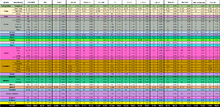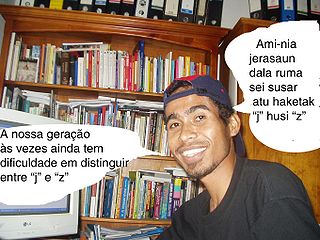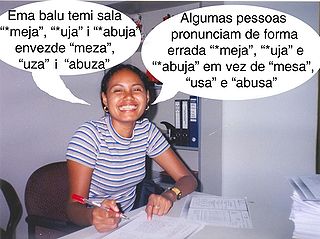Tetum (language)
| Tetum | ||
|---|---|---|
|
Spoken in |
East Timor , Indonesia | |
| speaker | approx. 900,000 | |
| Linguistic classification |
|
|
| Official status | ||
| Official language in |
|
|
| Language codes | ||
| ISO 639 -1 |
- |
|
| ISO 639 -2 |
tet |
|
| ISO 639-3 | ||
Tetum (also Tétum or Tetun , formerly Belu ) is one of the two official languages of East Timor and a minority language in the Indonesian West Timor . Tetum is a Malayo-Polynesian language that has adopted many elements from the Portuguese language and Indonesian / Malay . The Tetum ethnic group uses Tetum as their mother tongue in various dialects.
Number of speakers
In East Timor alone, more than 432,766 people speak Tetum as their mother tongue (2015). 62.5% of the total population can speak, read and write Tetum, another 1.3% speak and read, 2.2% only read and 25.7% only speak. Of the various dialects, 361,027 East Timorese state that Tetum Prasa is their mother tongue, 71,418 name Tetum Terik and 321 Nanaek (2015).
Most of the residents of the Indonesian administrative districts of Belu and Malaka also speak Tetum as their mother tongue.
Dialects

The following dialects are listed:
- Tétum Oficial (Tetun Prasa, Tétum-praça, Tetun Dili, Dili Tetun)
- eastern Tetum (Tetum Terik, Soibada, Natarbora, Lakluta)
- southern Tetum (Lia Fehan, Plain Tetum, Tasi Mani, Belu Selatan, Belu Tetun, Belunese)
- northern Tetum (Lia Foho, Hill-Tetum, Tasi Feto, Belu Utara, Belu Tetun, Belunese)
- Nanaek (Nana'ek)
When the Portuguese made Dili the new capital of their Portuguese Timor colony in 1769 , Mambai was still spoken in the surrounding area . The result was that the local Tetum Prasa ( Portuguese Tétum-praça ) has strong influences from the Mambai. However, the influence of Portuguese was particularly strong. Under Portuguese rule, one could only study in Portuguese, although Tetum and the other languages could be used. Nowadays it is mostly spoken in Dili and in the Ermera administrative office . Further away from the capital, in the east and on the south coast of East Timor, people traditionally speak Tetum Terik . Tetum Prasa is more widespread today through its use as a second language and is also taught in schools as Tétum Oficial . During the colonial rule by the Portuguese, Portuguese was the official language, but Tetum served as the lingua franca . After the annexation of East Timor by Indonesia , the Portuguese language was banned. However, the Catholic Church did not hold its masses in Bahasa Indonesia , but in Tetum and thus contributed to the development of the language and the establishment of identity. The Belu Tetum was the language of the ancient Wehale kingdom , which has its center in what is now the Indonesian part of Timor . Nanaek is spoken in Metinaro and along the coast between Dili and Manatuto .
vocabulary
The Tetum word for word is liafuan , derived from lia ("voice") and fuan ("fruit").
In the Tetum you will find words that distinguish the language as Austronesian, loanwords from Portuguese. There are also words that were taken directly from the Austronesian Bahasa Indonesia . For some terms, words of different origins are used in parallel, such as the Indonesian kota for city or the words prasa ( Portuguese praça, English market ) and sidadi ( Portuguese cidade, English city ).
Austronesian origin
Austronesian words:
- boot - "large"
- ki'ik - "small"
- mane - "man"
- feto - "woman"
- foho - "mountain"
- tasi - "sea"
- rain - "land"
Loan words from Bahasa Indonesia
Words derived from Malay:
- barak - "a lot" (from banyak )
- bele - "can" (from boleh )
- uma - "house" (from rumah )
- dalan - "street" (from jalan )
- karreta - "car" (from kereta )
- lima - "five" (from limah )
- oan - "man or child" (from orang )
- tulun - "help" (from tolong )
- malae - "stranger", "foreigner" (from melayu = "Malay")
Loan words from Portuguese
Words derived from Portuguese:
- aprende - "learn" (from aprender )
- demais - "too much"
- entaun - "so", "now" (from então )
- eskola - "school" (from escola )
- igreja - "church"
- istória - "history" (from história )
- paun - "bread" (from pão )
- povu - "people" (from povo )
- relijiaun - "religion" (from religão )
- serveja - "beer" (from cerveja )
- tenke - "must" (from tem que )
- ajuda - "help"
As in Indonesian, the sound [z] (written in Portuguese s or z ) in Tetum has often changed to [ʒ] (written j ). Examples: meja ("table") from mesa , kemeja ("shirt") from camisa . The Portuguese letters b and v were interchanged, as in serbisu ("work") from the Portuguese serviço .
Loan words from other origins
- stroberry - "strawberry" (from the English strawberry )
country names
- Alemaña / alemaun - "Germany / German"
- Áustria / austríaku - "Austria / Austrian"
- Listenstaina / listenstainianu - "Liechtenstein / liechtenstein"
- Suisa / suisu - "Switzerland / Swiss"
The Tetum name for East Timor is Timor Lorosa'e , which literally means "Timor of the rising sun". Lorosa'e is derived from loro ("sun") and from sa'e ("to rise"). Loron means "day".
numbers
- ida - "one"
- rua - "two"
- tolu - "three"
- haat - "four"
- lima - "five"
- neen - "six"
- hitu - "seven"
- ualu - "eight"
- sia - "nine"
- sanulu - "ten"
- sanulu-resin-ida - "eleven"
- sanulu-resin-rua - "twelve"
- sanulu-resin-tolu - "thirteen"
- sanulu-resin-haat - "fourteen"
- sanulu-resin-lima - "fifteen"
- sanulu-resin-neen - "sixteen"
- sanulu-resin-hitu - "seventeen"
- sanulu-resin-walu - "eighteen"
- sanulu-resin-sia - "nineteen"
- ruanulu - "twenty"
- ruanulu-resin-ida - "twenty-one"
- tolunulu - "thirty"
- haatnulu - "forty"
- limanulu - "fifty"
- neennulu - "sixty"
- hitunulu - "seventy"
- walunulu - "eighty"
- sianulu - "ninety"
- atus ida - "one hundred"
- atus ida resin ida - "one hundred and one"
However, Tetum speakers often also use Malay / Indonesian words, such as duapuluh ("twenty") instead of ruanulu , especially for numbers over a thousand.
See also
literature
- John Hajek, Alexandre Vital Tilman: East Timor Phrasebook. (= Lonely Planet phrase books ). Lonely Planet, Footscray et al. a. 2001, ISBN 1-74059-020-1 .
- Alexander Loch, Maria Tschanz: Small dictionary Tetum-German German-Tetum . Helmut Buske Verlag, Hamburg 2005, ISBN 3-87548-417-7 .
- George Saunders: Tetum for East Timor. Word by word. (= Gibberish. 173). Reise-Know-How-Verlag Rump, Bielefeld 2004, ISBN 3-89416-349-6 .
- W. Woertelboer: On the language and culture of the Belu (Timor). In: Anthropos. Volume 50.1, 1955, pp. 155-200.
Web links
- The languages of East Timor: Some Basic facts ( Memento from January 19, 2008 in the Internet Archive )
- Tetum-English dictionary
- Diccionario Teto-Português from 1907
- Repúblika Demokrátika Timor-Leste nian - Constitution of East Timor on Tetum ( Memento of August 20, 2007 in the Internet Archive ) (PDF file; 255 kB)
- Video on the biodiversity of East Timor from UNMIT on Tetum
Individual evidence
- ↑ Direcção-Geral de Estatística : Results of the 2015 census , accessed on November 23, 2016.
- ^ The Languages of East Timor: Some Basic Facts ( January 19, 2008 memento in the Internet Archive )










